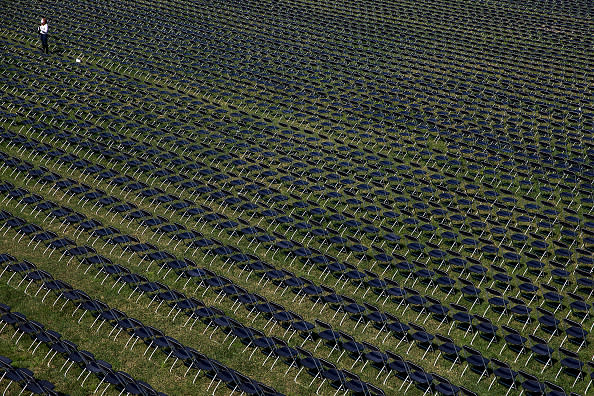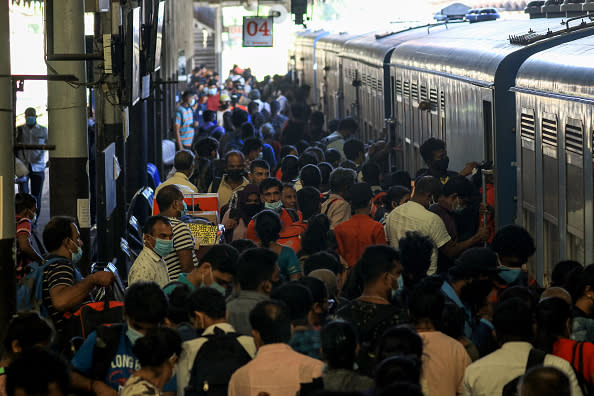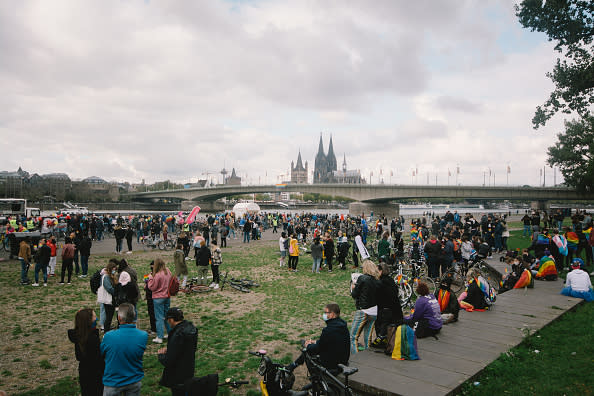Horrific Covid-19 spike as infections grow faster than ever before
More than one million cases of coronavirus have been recorded across the globe in just 72 hours.
Europe surpassed 100,000 daily Covid-19 cases for the first time last Thursday after countries such as Russia and United Kingdom registered no respite in the mounting number of infections every day in the past week.
Cases throughout Europe have been steadily rising even as new infections in worst-affected countries such as India and Brazil have shown signs of slowing down.
The US continues to lead the total number of cases globally with more than 7.7 million infections and over 214,000 deaths, according to Johns Hopkins University data.
India ranks second with more than 710,000 cases and 109,000 deaths.

The epicentre of the outbreak in the European region has moved to the United Kingdom, Russia, Spain and France which have reported at least 10,000 cases each in the last few days.
France has more than 732,000 cases, while the UK has more than 606,000 infections.
There were as many as 45,000 new Covid-19 infections in England each day between September 18 and October 5, according to a study by Imperial College London and a consulting firm.
Countries reinstall Covid-19 restrictions
The surge in cases has forced several countries to reintroduce virus pandemic restrictions.
Scotland has unveiled new rules ordering all pubs and restaurants in Glasgow and Edinburgh to close at 6pm. The new measures will last for 16 days.
'Madness': Unbelievable scenes at department store in Covid-ridden city
Detail on Trump's hand fuels speculation after Covid diagnosis
German Chancellor Angela Merkel’s chief of staff Helge Braun on Sunday said Germany should continue capping the number of people allowed at gatherings and clamp down on unnecessary travel as the country battles rising coronavirus infections.
“We must be a bit stricter in places where infection chains spread mostly, which is parties and, unfortunately, also travel,” Mr Braun told public broadcaster ARD.
“We are at the beginning of a second wave and only the politicians’ and the population’s determination will decide whether or not we can avoid it, or slow it down.”
Germany had managed to keep the number of new infections and deaths lower than many of its neighbours, but the daily number of new cases has leapt above 4,000 since Thursday - the highest since April.

Sunday’s count fell below the mark, but test reports tend to be slower during weekends.
Ms Merkel and mayors from Germany’s 11 largest cities agreed on Friday to adopt stricter measures if infections exceed a threshold of 50 cases per 100,000 population in a week.
More than 20 cities are now above that level, which has caused a patchwork of internal travel restrictions.
Mr Braun, a medical doctor, said test centres should prioritise health sector workers and people showing symptoms over tourists.
Holidaymakers can circumvent the local travel curbs if they produce negative test results.
Lebanon said on Sunday it will close bars and nightclubs to help contain the Covid-19 outbreak which has killed more than 450 people in a country also reeling from financial crisis and an explosion in Beirut two months ago.

The Interior Ministry shut bars and nightclubs until further notice and enforced local lockdowns on 169 villages and districts across the country, up from 111 last week.
It also reiterated a 1am to 6am curfew as well as a ruling, which has not been universally observed, that masks must be worn when travelling.
There have been 52,558 infections and 455 coronavirus-related deaths reported in the country here since the pandemic began. With a population of just six million, Lebanon has been reporting more than 1,000 cases daily in the last few days.
Hospital intensive care units have reached a critical 82 per cent of capacity, according to the WHO. Meanwhile, the virus continues to spread in overcrowded prisons, public hospitals and cities, where mask-wearing remains lax.

Mexico and New Zealand secure vaccines
Mexico’s government announced on Saturday that it paid the World Health Organisation A$220 million to secure access to Covid-19 vaccines through the agency’s COVAX plan as countries across the globe race to secure supplies.
The global health agency’s COVAX Facility is a multilateral initiative running trials on several potential vaccines. The latest payment will allow Mexico to acquire enough doses of a vaccine to immunise up to a fifth of the country’s population of around 125 million people, the foreign ministry said.
The foreign ministry statement added that the government had presented the “risk guarantee” paperwork for another $27.6 million, which it described as part of the contractually required commitments to access the eventual vaccine supply. The statement did not provide additional details on the second payment.
According to the health ministry, Mexico has confirmed nearly 810,000 cases of the highly-contagious respiratory disease caused by the coronavirus, along with more than 83,000 recorded deaths, though both likely represent only a fraction of the true number of infections and fatalities due to little testing.
The government signed its COVAX contract late last month.

The New Zealand government signed a deal on Monday to buy 1.5 million Covid-19 vaccines from Pfizer Inc and Germany's BioNTech, with delivery potentially as early as the first quarter of 2021.
The government did not disclose financial terms of the deal, its first vaccine purchase, which will provide enough doses to vaccinate 750,000 people.
Officials said talks were continuing with other drug companies to secure more vaccine supplies for the country of 5 million people and further announcements were expected next month.
"The additional agreements will ensure that once the portfolio is completed, we will have sufficient Covid-19 vaccines for the whole population," Research Minister Megan Woods said in a statement.

The Pfizer-BioNTech vaccine is one of the leading candidates in the race to be the first to get regulatory approval in the United States and Europe.
New Zealand appeared to have stamped out community transmission of coronavirus earlier this year following a tough nationwide lockdown. A renewed outbreak in the city of Auckland in August was also brought under control with fresh lockdown measures.
The country has reported just over 1,500 cases, including 25 deaths, far less than most other developed nations.
with AAP and Reuters
Do you have a story tip? Email: newsroomau@yahoonews.com.
You can also follow us on Facebook, Instagram and Twitter and download the Yahoo News app from the App Store or Google Play.

 Yahoo Lifestyle
Yahoo Lifestyle 

